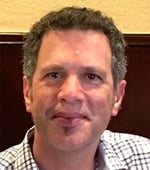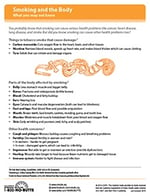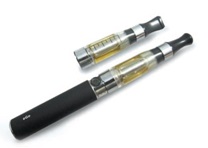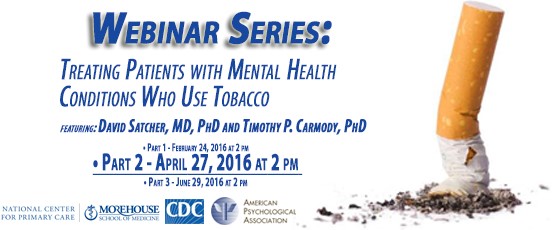
The California Smokers’ Helpline is pleased to offer this free online continuing education course, Tobacco Dependence Treatment in Special Populations: What's the Same and What's Different?
A growing body of research indicates that healthcare providers do not systematically intervene with smokers to provide tobacco independence treatment. This is especially true with teens and smokers with mental illness and/or substance use disorders. With pregnant smokers, there is a need to sustain the quit postpartum. There are special considerations to take into account when helping teens, pregnant smokers, and smokers with behavioral health conditions to quit.
Click below to get started. Once you complete the course, you will receive 1.25 AMA PRA Category 1 Credits™. You can also click below if you do not need CE credits but are interested in the course materials.
Target Audience
The target audience for this course includes nurses, nurse practitioners, physicians, pharmacists, psychologists, alcohol and drug counselors, physician assistants, and other health care professionals who care for pregnant smokers, teens and smokers with mental illness and/or substance use disorders.
Objectives
At the conclusion of this activity, participants should be able to:
- Deliver effective and efficient clinical tobacco interventions to patients using systematic approaches to encourage tobacco cessation.
- Describe population-based trends of tobacco use among smokers with co-occurring mental health and/or substance use disorders, teens and pregnant smokers.
- Identify the special circumstances for smokers with co-occurring mental health and/or substance use disorders, teens and pregnant women
Presenter List
 Dr. Tedeschi is a licensed psychologist (#PSY 14241) at the University of California-San Diego School of Medicine, Moores Cancer Center. He has worked there since 1994 as the Clinical Director of the California Smokers' Helpline and the Center for Tobacco Cessation. At the Helpline he is responsible for clinical supervision, counseling protocol development, counselor training, and continuing education. At the Center he provides technical assistance and training for medical and behavioral health professionals on tobacco cessation interventions. Dr. Tedeschi also has several years of previous clinical experience providing psychotherapy for individuals, couples and groups in settings including community mental health, psychiatric in-patient, and university counseling centers. He teaches graduate courses in counseling part time and maintains a small practice in consulting psychology. Dr. Tedeschi holds a Ph.D. in counseling psychology from the University of Missouri, Kansas City; an M.A. in counseling psychology from Boston College; and a B.A. in psychology from Kutztown University of Pennsylvania.
Dr. Tedeschi is a licensed psychologist (#PSY 14241) at the University of California-San Diego School of Medicine, Moores Cancer Center. He has worked there since 1994 as the Clinical Director of the California Smokers' Helpline and the Center for Tobacco Cessation. At the Helpline he is responsible for clinical supervision, counseling protocol development, counselor training, and continuing education. At the Center he provides technical assistance and training for medical and behavioral health professionals on tobacco cessation interventions. Dr. Tedeschi also has several years of previous clinical experience providing psychotherapy for individuals, couples and groups in settings including community mental health, psychiatric in-patient, and university counseling centers. He teaches graduate courses in counseling part time and maintains a small practice in consulting psychology. Dr. Tedeschi holds a Ph.D. in counseling psychology from the University of Missouri, Kansas City; an M.A. in counseling psychology from Boston College; and a B.A. in psychology from Kutztown University of Pennsylvania.
Accreditation
UC San Diego Accreditation Statement
The University of California, San Diego School of Medicine is accredited by the Accreditation Council for Continuing Medical Education to provide continuing medical education for physicians.
Medical Credit Designation Statement
The University of California, San Diego School of Medicine is accredited by the Accreditation Council for Continuing Medical Education to provide continuing medical education for physicians.
AMA: The University of California, San Diego School of Medicine designates this enduring activity for a maximum of 1.25 AMA PRA Category 1 Credit™. Physicians should claim only the credit commensurate with the extent of their participation in the activity.
AAPA: AAPA accepts certificates of participation for educational activities certified for AMA PRA Category 1 Credit™ from organizations accredited by the ACCME or a recognized state medical society. Physician assistants may receive a maximum of 1.25 hours of Category 1 credit for completing this program.
NURSES: For the purpose of recertification, the American Nurses Credentialing Center accepts AMA PRA Category 1 Credit™ issued by organizations accredited by the ACCME. For the purpose of relicensure, the California Board of Registered Nursing accepts AMA PRA Category 1 Credit™ (report up to 1.25 hours of credit and list "CME Category 1" as the provider number).







 The
The 

 Dr. Lyne Scott is an Associate Professor of Pediatrics (USC Keck School of Medicine), Allergy and Immunology Division Chief, Allergy and Immunology Fellowship Training Program Director, and Director of the Breathmobile Program at LAC+USC Medical Center. Dr. Scott has extensive knowledge regarding the infrastructure of the Breathmobile Program, implementation of disease management principles in asthma disease tracking, and outcomes results for the Breathmobile Program. Dr. Scott has participated in several peer-reviewed publications describing findings of the LAC+USC Breathmobile Program and is the lead author on a collaborative manuscript describing outcomes for Breathmobile Programs across the country. She has received funding from National Institutes of Health for health disparities research. She currently serves on the Advisory Board of CEASE (The Clinical Effort Against Secondhand Smoke Exposure), a First 5 California Initiative. Her interests include improving access to and delivery of effective asthma care for children in Los Angeles and abroad.
Dr. Lyne Scott is an Associate Professor of Pediatrics (USC Keck School of Medicine), Allergy and Immunology Division Chief, Allergy and Immunology Fellowship Training Program Director, and Director of the Breathmobile Program at LAC+USC Medical Center. Dr. Scott has extensive knowledge regarding the infrastructure of the Breathmobile Program, implementation of disease management principles in asthma disease tracking, and outcomes results for the Breathmobile Program. Dr. Scott has participated in several peer-reviewed publications describing findings of the LAC+USC Breathmobile Program and is the lead author on a collaborative manuscript describing outcomes for Breathmobile Programs across the country. She has received funding from National Institutes of Health for health disparities research. She currently serves on the Advisory Board of CEASE (The Clinical Effort Against Secondhand Smoke Exposure), a First 5 California Initiative. Her interests include improving access to and delivery of effective asthma care for children in Los Angeles and abroad. Tobacco use is the single largest preventable cause of disease and death in the United States. As part of its goal to improve public health and protect future generations from the risks of tobacco use, the FDA has extended its authority to cover all products that meet the definition of a tobacco product.
Tobacco use is the single largest preventable cause of disease and death in the United States. As part of its goal to improve public health and protect future generations from the risks of tobacco use, the FDA has extended its authority to cover all products that meet the definition of a tobacco product. Show us your best work! What have you or your organization created to encourage people to call the
Show us your best work! What have you or your organization created to encourage people to call the 


 Dr. McHugh is an Obstetrician & Gynecologist (OB/GYN) at the St. Bernardine Medical Center in San Bernardino, CA. He serves as Co-Chair of the Preconception Health Care Council of California. In addition, Dr. McHugh is an Assistant Professor at University of California, Irvine. He received his MD from Harvard Medical School and Massachusetts Institute of Technology. Since then, Dr. McHugh has worked in the medical field for over 20 years in various positions, such as Department Chair of Obstetrics and Gynecology at Scripps Mercy Hospital.
Dr. McHugh is an Obstetrician & Gynecologist (OB/GYN) at the St. Bernardine Medical Center in San Bernardino, CA. He serves as Co-Chair of the Preconception Health Care Council of California. In addition, Dr. McHugh is an Assistant Professor at University of California, Irvine. He received his MD from Harvard Medical School and Massachusetts Institute of Technology. Since then, Dr. McHugh has worked in the medical field for over 20 years in various positions, such as Department Chair of Obstetrics and Gynecology at Scripps Mercy Hospital. Robert is currently President of the Organization of Teratology Information Specialists (OTIS) Board of Directors. He is a Senior Teratogen Information Specialist and Community Outreach Coordinator with MotherToBaby California, responsible for increasing awareness about the value of MotherToBaby’s services and cultivating new partnerships with healthcare providers and community‐based organizations.
Robert is currently President of the Organization of Teratology Information Specialists (OTIS) Board of Directors. He is a Senior Teratogen Information Specialist and Community Outreach Coordinator with MotherToBaby California, responsible for increasing awareness about the value of MotherToBaby’s services and cultivating new partnerships with healthcare providers and community‐based organizations.
 Presenter
Presenter




